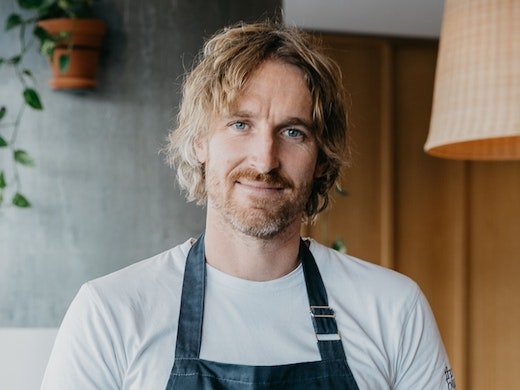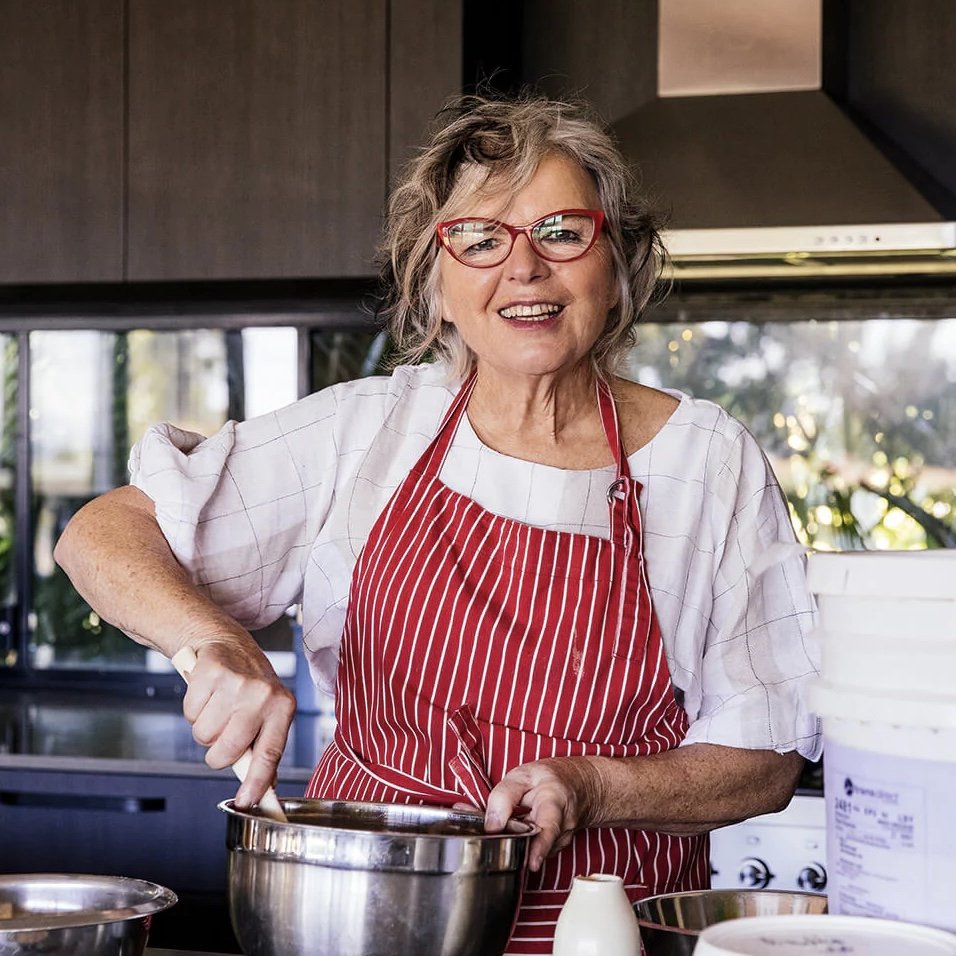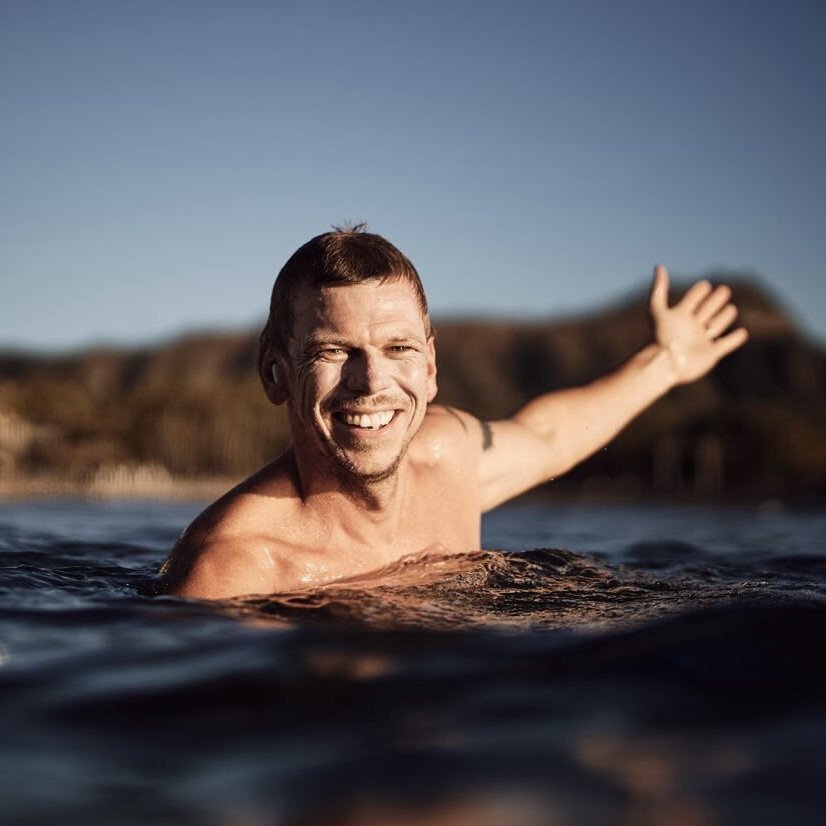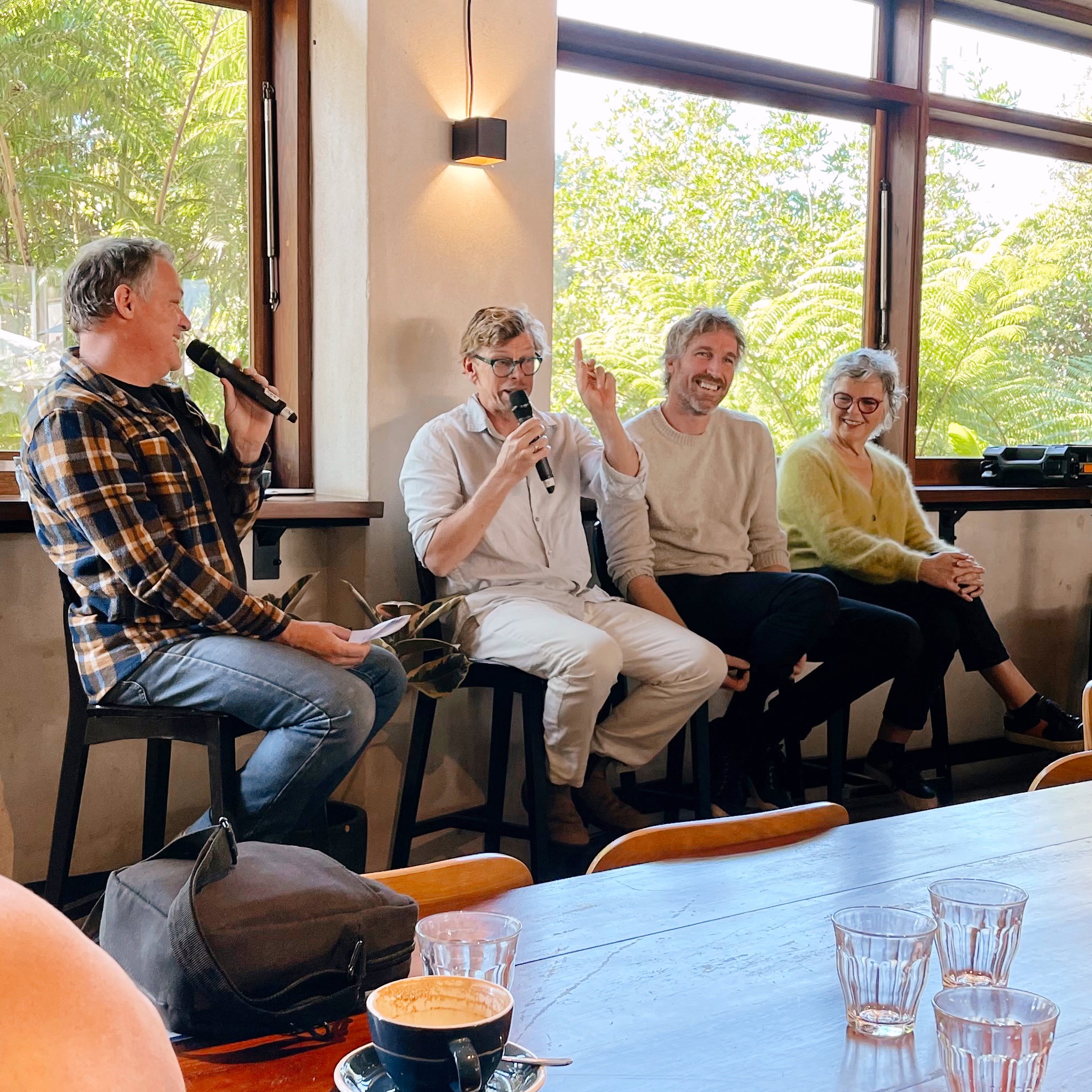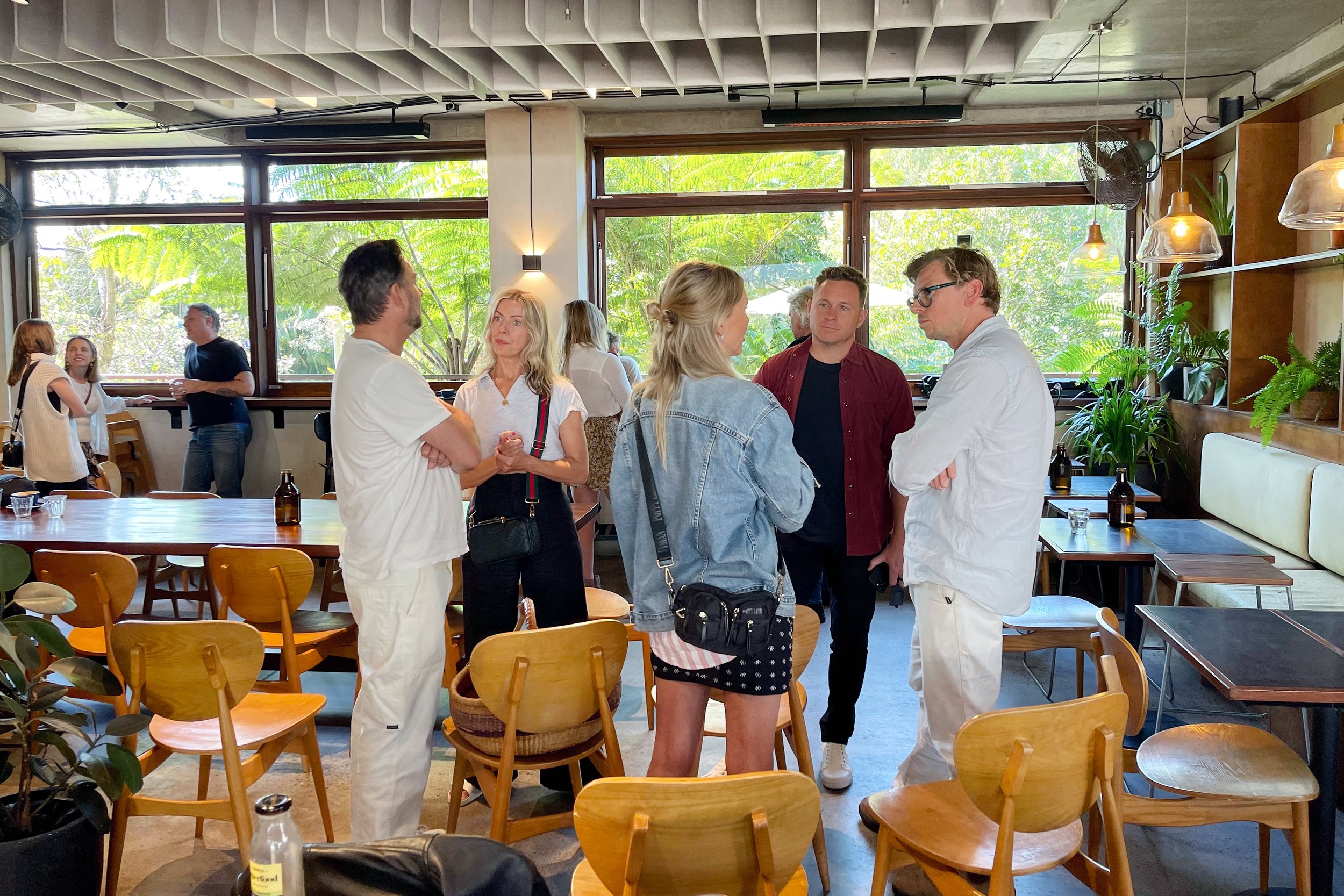PROBLEMS FOR BREAKFAST, AUG 23
It was another star-studded panel for the latest Problems for Breakfast, our semi-regular business chats, with Pam Brook (co-founder Brookfarm and Cape Byron Distillery), Phil Gallagher (freelance photographer and creative director) and Darren Robertson (co-owner Three Blue Ducks) dishing up their wisdom. No wonder it was a sell-out crowd at Barrio.
Didn’t manage to score a ticket? You’re in luck, because we managed to capture several nuggets of gold from the panel. Read on!
If you'd like to share a problem at the next event in October, or just listen to other people's, join the Habitat newsletter and stay in the loop.
The questions and answers (as best we can recall them)...
Q. Cristina is about to launch some plant-based laundry products online. Whether online, or in the real world, what are the fundamentals that make a great launch? Also, what are some of the pit falls?
"Know your numbers. I'm a numbers girl and I love a good spreadsheet. You've got to know how much you need to make when you launch, the following next week, and the next year. I remember when we were starting out, selling muesli at the local markets, [my husband] Martin came home and very happily said, 'I made $500 today!' And I told him, we need to make $2,000, so get back out there." – Pam.
"It's great you're doing plant-based, but the danger is there's phrases that become buzzwords. Now everything is vegan-friendly from wine to water. You've got to have a good story to tell beyond the buzzwords." – Darren.
"Influencer isn't a dirty word. It can be scary investing in these people, giving them thousands of dollars’ worth of product before you've even launched, but I've had huge returns from this sort of marketing when launching new products. Also word of mouth is still one of the strongest ways to market anything. Whether it’s a service or a product " – Phil.
Q. The eternal problem – do what you love, or do the idea you know will make money? Also, what happens when you get to do what you love but it eventually becomes just another job? Josh.
"Always choose doing something you love. And if that eventually starts to feel like a regular job, take a step back, because you're probably working too much inside the business, and not getting to work on the business and do the things you originally loved about it. Also, I was a ski instructor for a little while, but I quit, because I don't think you should ever make your favourite hobby your job. " – Pam.
"Over the years, I've had so many friends in the industry tell me about their dream to open a little 15-seater, and how they're going to do it, but they can't leave their job right now. Then they get on a good salary, and there's a badge of honour working at some places, and they never chase the thing they love. So, I reckon take that first step now." – Darren.
"The reality is everything becomes a job eventually, but doing something you love is the thing that gets you through. Some of my hardest jobs have been for my dream clients, and it's only because I love what I do that I keep grinding away and do my best." – Phil.
Q. How do you get experience when every job asks for experience? Hanna.
"If you want to work for someone, send them an email, or go and knock on their door. Showing you're willing to learn and are keen always goes a long way. Also, being willing to learn about a business from the bottom up, that's a great way to get where you want to go." – Pam.
"Walk into a restaurant, tell them you want work, you're passionate, and they'll find a spot for you eventually. Be persistent but humble. People used to come in and work for free, but that's illegal now. Just going and handing someone your CV, and having a two-minute chat, is a big thing. Get a foot in the door by peeling spuds, washing dishes, and build from there " – Darren.
"Be honest about your experience. Don't pretend you've got experience, because take it from me, you can instantly tell when you get on a set, and someone doesn't have it. People are busy, so send a short email that's friendly but gets right to the point. Also, networking helps if you're a sole trader and going to industry events like this." – Phil.
Q. As a freelancer, how do you find new clients? I find it hard to manage all the business stuff as a soul trader and struggle to get out and find new business. Mark.
"It's really hard to get a job done today, be organising a job for tomorrow, and be thinking about getting more work for next month. If you do a great job, your clients will help get you more work, because they'll tell people about you. Staying in touch with regular clients is important too – let them know about your availability, or if you've got new equipment. And social media is critical. Gone are the days of just having a website. Now you need to be on LinkedIn, YouTube, and Instagram, because you never know where a potential client is going to find you." – Phil.
Q. Times are tough. How do you maintain a sense of optimism in business? Louise.
"Always be looking for opportunities. Don't listen to people who say the market is down. That's simply not true. There's always some way to make things happen for your business. Talk to the people you work with, and don't keep everything in your head. That helps. And if you've got problems, compartmentalise them, so you can focus on them individually, and not feel overwhelmed." – Pam.
"I see a lot of things as positives. I love it when new restaurants open up, because I'm a big believer in creating food hubs, so people can have a drink in one spot, then walk across the street and have a snack someplace else, and then walk to dinner somewhere else." – Darren.
"Adapt or die. I’ve experienced budget changes recently with clients. Diversify your offer so that you can generate more revenue and capture more of the work." – Phil.
Q. What's the biggest business hurdle/f@uck up you've ever faced and how did you get through it? Emily.
"We've never been in Coles or Woolies, by choice, but we did go into Costco when they first opened in Australia. I did the deal, but I forgot to ask what their margins were, and their margins are very small. So when the product landed on their shelves it was about $10 cheaper than any of our other retailers. So, I rang them and said I'd made a mistake. You have to own it in those situations. And I said they had to raise the price, or we'd have to pull the product. And they wouldn't change the price, so that's what we did. It was either keep Costco or lose all our other retailers. Anyway, a friend said you'll never get back in there, but when I pulled the product I told the guy, 'I'll come back with something even better' and nine months later that's exactly what we did. And it still sells there today." – Pam.
"When we opened one place, we had this brilliant idea that every item on the dinner menu would be the same price. So, it was $15 for everything, whether it was the lobster or the mushroom dish, because we thought the farmer who grew the mushrooms deserved to be held in the same regard as the shellfish. Then we couldn't work out why we were going broke. Thank God we found Jeff, our numbers guy." – Darren.
"Getting burnt out was the biggest mistake I've made. Only when I went down in flames did I realise that you can't do everything by yourself. So I took a sabbatical, then I surrounded myself with a good team of people, and today I can do more work than before, but it doesn't take the same toll on me or my family." – Phil.
Q. When you've got multiple projects on the go, how do you divide your time and attention? And how do you make sure you're not giving too much time to one thing and neglecting another? Neil.
"There's always a new and shiny thing over there. So, the crucial thing is to understand which of the projects you deliver are the most important. It's probably not the shiny thing, but the shiny thing is important, because it keeps work interesting and fun. We introduced a gate process to better navigate this recently. I'm still learning." – Pam.
"This is a real problem that I've seen time and time again. We just opened a new restaurant in Bellingen and right now we've got seven owners all arguing over the font on a drinks menu while the world is going up in flames. Honestly. Figure out how you can maximise your impact on your business. Keep coming back to that." – Darren.
"For me, I find using the organisational tool Asana is super handy, especially when I'm working with new people. You can create tasks on there and add as much detail as you like. Another good app is Toggl, which allows you to track how much time you're spending on various tasks. You can start it on your laptop and stop it on your phone. It's great for clients who want to see a breakdown of your hours and which tasks have taken up the most time. I’ll focus on a task for an hour with no distractions. If I just focus on one task, I can get so much high-quality, productive work done, rather than trying to do everything." – Phil.
__________
Hungry for more nuggets of wisdom? More here, when Jamie Cook (Stone & Wood), Louise Bannister (frankie mag) and Odette Barry (Odette & Co) solved our problems.


